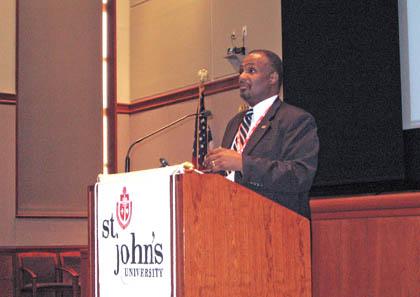By Anna Gustafson
A bevy of security officials, from U.S. State Department representatives to the head of security for the NBA, gathered at the Queens campus of St. John’s University for the second annual emergency conference last week to discuss everything from drafting disaster plans for students studying abroad to challenges facing NBA players in Brazil.
The daylong seminar, held March 12 in the university’s School of Law’s Belson Moot Courtroom, brought together more than 90 officials from area colleges and universities and security representatives in order to discuss safety issues involving students studying outside of the United States. More than 20 schools were represented at the forum, including Queens College, Columbia and New York University.
St. John’s officials said the conference was especially pertinent in the post−Sept. 11 era and because the number of American students studying abroad is increasing annually and is expected to jump from 200,000 this year to 500,000 over the next decade, according to the Institute for International Education’s statistics.
“We wanted to address the whole concept of being prepared and not having to ask fundamental questions, like how to contact students during a disaster,” said Gerard McEnerney, head of St. John’s’ emergency management and the assistant vice president and executive director of the university’s Staten Island campus.
St. John’s now sends about 200 students to study abroad in such countries as France and Italy. Though the university has emergency plans for students in other countries should they encounter anything from a natural disaster to a terrorist attack, McEnerney said the conference gave ideas to improve the plans and allows education officials to connect with security personnel who could be of help in case of a future disaster — such as Yolanda Parra, who works in the federal Office of Overseas Citizens Services, a division of the State Department.
“We provide financial assistance to U.S. citizens,” said Parra, who has worked in Jerusalem and Tokyo for the U.S. government. “We have students who have been backpacking and have run out of money. We’ll give them a loan to get home.”
Bernie Tolbert, senior vice president of security for the National Basketball Association, spoke of the need to often think outside the box when securing the safety of everyone from students to professional sports players outside American borders.
“Our NBA players were going to build a basketball court in an area run by gangs in Sao Paulo, Brazil,” Tolbert said. “We had to deal with a drug lord to secure this area, which isn’t ideal, but we had to do it.”
Elena Carrington, who works for the State Department, emphasized the importance of students staying away from public demonstrations, like protests, and what pupils should do if they do find themselves in something like a riot.
“They should not take sides or try to gather information,” Carrington said.
Carrington and William Ho, a special agent in the FBI, said students and professors abroad should be aware of any efforts to watch their movements — such as attempts to monitor their e−mail or travels in public spaces.
“To stay off the radar, students should not photograph military institutions or personnel, and they should dress as blandly as possible,” Ho said. “For example, don’t wear your Free Tibet T−shirt in China.”
Reach reporter Anna Gustafson by e−mail at agustafson@timesledger.com or by phone at 718−229−0300, Ext. 174.



































